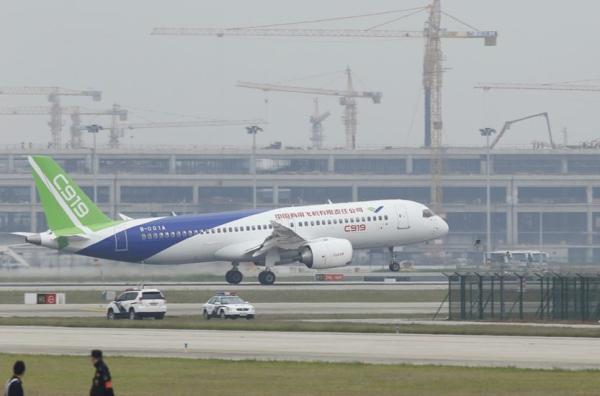
useful numbers
| name | number |
| inquiry | 96990 |
| pudong airport | |
| luggage storage | t1:68346324 |
| t2:68340076 | |
| lost&found | t1:68346324 |
| t2:68340417 | |
| hongqiao airport | |
| luggage storage | t1:22344553 |
| t2:22381085 | |
| lost&found | t1:22344553 |
| t2:22381086 | |
home >> News
PVG helps make C919 a success

The C919, China's first domestically-produced large passenger aircraft, landed at Shanghai Pudong International Airport (PVG) on May 5, 2017, following its debut flight.
The successful flight was partly down to the preparation of PVG which included allocating appropriate personnel, facilities and logistical support. Air traffic and passenger volume was also carefully managed for the event.
PVG resumed normal operations within 7 minutes following the C919's debut flight. To guarantee normal flight operations during C919's high-speed taxiing test and first flight, the airport authorities adjusted flight schedules, reduced traffic, negotiated with air traffic control departments for air traffic coordination, and helped airlines reschedule flights.
PVG's efforts also included establishing temporary checkpoints and putting fire trucks on standby.
In addition, PVG put a special team on 24-hour standby for support services. Since the C919's first ground test on March 17, PVG has been used as the location for more than 10 ground tests.
Apart from the aviation security training for staff from the Commercial Aircraft Corporation of China Ltd (COMAC), the team helped guide the C919's ground tests and transported the flight crew and maintenance staff. A refueling truck was also allocated to provide the C919 with fuel during its various tests.
The C919's maiden flight required a high-specification runway and test track for the ground test. The support team cleaned and checked both the taxiway and two runways twice a day, before ground tests commenced. There was also a second check covering test tracks and runways to ensure continuation of normal operations for other aircraft.
Most of the ground tests were undertaken in the early mornings to reduce the impact on the airport's normal operations. However, poor visibility and strong winds created challenges for the support team, requiring extra technical support.

